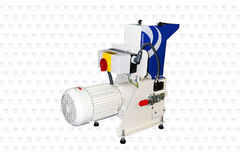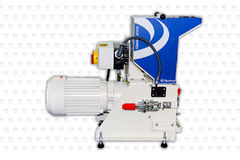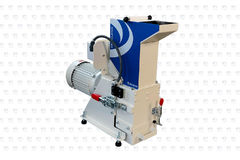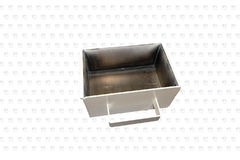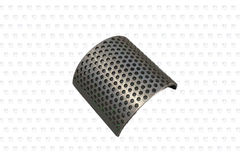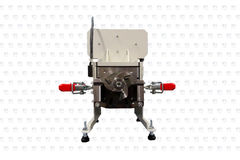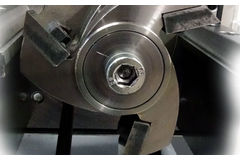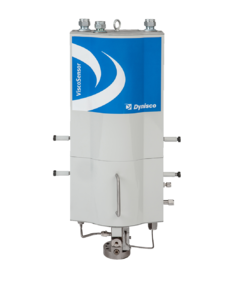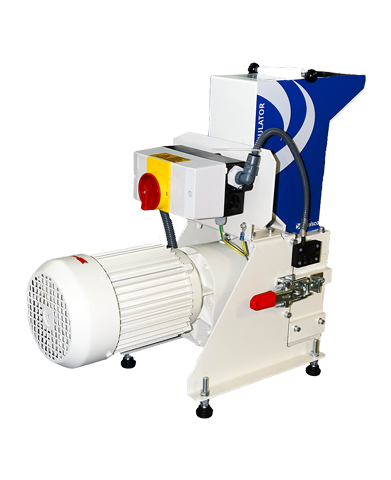
MiniGran - Laboratory Granulator
The Dynisco MiniGran Lab Granulator is designed for the granulation of small sprues. With its very compact dimensions, this granulator can be accommodated almost anywhere and therefore is very suitable for laboratory applications. The granulator is suitable for all kind of plastic materials, due to the low rotor speed the plastic materials are processed to high-quality, low-dust regrind. The cutting chamber of the MiniGran, including rotor and screen, are made of carbon steel, to fulfill high purity standards for regrind. In addition, the cutting chamber is hermetically sealed to prevent the regrind from being contaminated by incoming air or dust when extracted by suction. It is therefore possible to use this granulator under clean room conditions. The granulating chamber can be opened quickly and simply and can be cleaned rapidly, facilitating quick changes in materials or color. The optimized cutting geometry with a cascaded rotor in chevron design guarantees a very effective granulating process and also reduces the energy consumption.
MiniGran - Laboratory granulator for plastics
MiniGran - Laboratory granulator for plastics
MiniGran - Laboratory granulator for plastics
MiniGran - Removable screem
MiniGran - Laboratory granulator for plastics
MiniGran - Laboratory granulator for plastics
Inquiry system
Configure your own device, according to your requirements and needs. If you are not sure about the configuration, make the necessary information about the processed materials in the notes. Thanks to this information, we are able to create several offers depending on the equipment and after consultation you can choose according to your needs. If you need a comparison for tenders, we will be happy to help you find an alternative product from the Dynisco portfolio.
If you need more information do not hesitate to contact us.
Dynisco Configuration Code:
Technical Data
| Openable cutting chamber: |
80 mm x 100 mm |
| Rotor diameter: |
90 mm |
| Rotor speed: |
112 U/min |
| Rotor blades: |
9 pcs. |
| Stator knives: |
2 pcs. |
| Engine power: |
0,75 kW |
| Power supply: |
230, 400, or 480 V / 50 Hz |
| Screen hole size: |
3-5 mm |
| Screen: |
With 4 mm holes as standard, alter.
3 and 5 mm holes
(specify upon order) |
| Weight |
Approximately 40 kg |
Dimensions
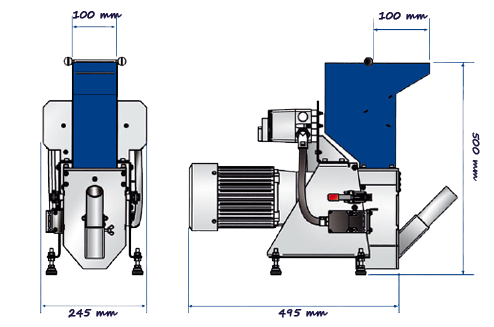

The Dynisco Polymer Test LME Laboratory Mixing Extruder is a unique laboratory tool developed to evaluate the processability of a variety of plastics and rubbers prior to production. From very fine powders to coarse materials, the LME will meet many extruding needs. The LME possesses a movable header and dial gage that allows for constant mixer adjustability. While in operation, the rotational shearing (mixing) is controlled by adjusting the distance between the end of the rotor and the inside header.
Introducing the LMI6000 series. The new generation of comfort and performance. The automated electromechanical lifting mechanism simplifies weight lifting. A larger, adjustable touch display allows for easy operation. Modernized hardware architecture ensures higher performance. Software automation enables one-button test initiation. The LMI6000 revolutionizes your work environment, combining comfort, efficiency, and reliability.
This LMFI5500 series Melt Flow Indexer allows the measurement of most rheological parameters of thermoplastics including IV for PET. The LMFI 5500 series is one of the most accurate equipment of the type in the world. The intuitive controls make it easy to use, it has an expert mode for experienced operators that significantly speeds up the measurement process, and sophisticated features and technologies ensure the highest possible measurement accuracy. Gravity correction and dual zone heating not only meet but exceed the requirements of the latest ISO1133-2 valid standard.
This model is perfect for quality control in a laboratory, institutes or universities where accuracy really matters. Try the LMFI 5500 and get a reliable and accurate instrument that will allow you to improve the quality of your products.
The new LCR 7000 Capillary Rheometer range offers a number of new features and meets the requirements of 24-hour operation while maintaining the highest possible accuracy, repeatability and sensitivity. The LCR series rheometers are versatile and easy to use, but offer the most complex methods for polymer characterization, data analysis and reporting capabilities. The LCR series can be used with a standard load cell and a pressure transducer mounted in the rheometer chamber.
Meets standards:
DIN ISO-11433, DIN-53014, DIN-54811, ASTM-D3835
Specifically designed for the thermoplastics resin industry. The ViscoIndicator duplicates the test conditions of a laboratory Melt Flow Rate (MFR) tester or capillary rheometer. Melt viscosity measurements such as melt flow rate and Intrinsic viscosity are primary specifications of thermoplastic resins.
Dont forget- our ViscoIndicator is IoT enabled. The IoT native software of the ViscoIndicator allows for real-time access to your testing information.With the Dynisco Cloud Connect Subscription, you get comprehensive access of rheological data, correlations, and dashboards. This interface allows for a complete “Window into the Process” providing valuable insight to your polymer process.
The ViscoSensor provides continuous measurements of the melt flow rate or apparent viscosity directly on the manufacturing process. The ViscoSensor system consists of two parts: a Viscosensor Rheologic Sensing Unit (RSU), connected directly to the process, and a Rheologic Control Unit that controls the ViscoSensor test parameters, provides outputs of computed results, and provides communications to an external distributed control system when required.
Specifically designed for the thermoplastics resin industry, the Dynisco CMR series can be configured to measure melt flow rate, high/low load melt flow rate, apparent viscosities, or to perform other customer defined tests.The CMR system consists of two parts: a rheometer head connected directly to the process which samples, conditions, and measures the melt flow of the resin, and an RCU (Rheometer Control Unit) that controls the CMR test parameters (temperature, pressure, rate), and provides outputs of computed results, and communications to an external distributed control system when required.
 Overview of Available Certificates and Approvals: Visit this link, which will take you to a page with a comprehensive list of current certificates and approvals for our products. Here, you can verify that our offerings meet the highest standards of quality and safety.
Overview of Available Certificates and Approvals: Visit this link, which will take you to a page with a comprehensive list of current certificates and approvals for our products. Here, you can verify that our offerings meet the highest standards of quality and safety.
 Discover the world of our online E-Learning page and find out how to streamline your daily use of our products. Our practical and comprehensive courses and informational materials will show you how to simplify and enhance the use of our technologies, uncover new information and techniques, and optimize work processes. With these resources, you'll achieve higher efficiency, save time, and improve your work results.
Discover the world of our online E-Learning page and find out how to streamline your daily use of our products. Our practical and comprehensive courses and informational materials will show you how to simplify and enhance the use of our technologies, uncover new information and techniques, and optimize work processes. With these resources, you'll achieve higher efficiency, save time, and improve your work results.
 Our instructional videos offer an interactive way to learn about our products. Combining visual and auditory content, they provide practical solutions to common issues, saving you time and avoiding potential problems. If you encounter an issue, our video manuals offer detailed instructions and practical tips to help you resolve it. Available at any time, they provide a convenient resource that complements our technical support.
Our instructional videos offer an interactive way to learn about our products. Combining visual and auditory content, they provide practical solutions to common issues, saving you time and avoiding potential problems. If you encounter an issue, our video manuals offer detailed instructions and practical tips to help you resolve it. Available at any time, they provide a convenient resource that complements our technical support.
 Our technical articles offer a practical way to learn more about our products and their use. They provide detailed information and practical tips on how to solve common problems, saving you time and helping you avoid potential issues. If you still encounter a problem, our technical articles offer specific instructions for solving it. They are available at any time and are a convenient source of information that complements our technical support.
Our technical articles offer a practical way to learn more about our products and their use. They provide detailed information and practical tips on how to solve common problems, saving you time and helping you avoid potential issues. If you still encounter a problem, our technical articles offer specific instructions for solving it. They are available at any time and are a convenient source of information that complements our technical support.









